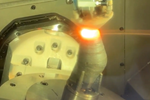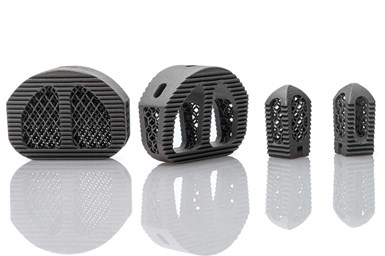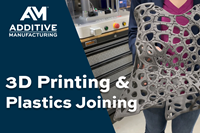Amnovis Simplifies Regulatory Submission for 3D Printed Titanium Implants
Amnovis has incorporated its additive manufacturing process expertise and experience with titanium 3D printing into an FDA Master File to help facilitate customers’ regulatory submissions for 3D printed titanium implants.
Amnovis has created an FDA Master File that simplifies regulatory submission for 3D printed titanium implants. The Master File will benefit medical device OEMs worldwide, giving them faster time-to-market in the U.S., the company says.
In its FDA Master File, Amnovis elaborates on all critical aspects of its qualified titanium 3D printing processes for Ti grade 1 and Ti-6Al-4V grade 23. This enables Amnovis to proactively address typical FDA concerns about these processes, thereby simplifying the regulatory submissions of 3D printed titanium implants in the U.S. for medical device OEMs worldwide. The information contained in the FDA Master File includes the knowledge of Amnovis’ founders in titanium 3D printing and the operational expertise of the Amnovis team.
Amnovis is an Additive Manufacturing (AM) contract manufacturer with founders who have backgrounds in manufacturing high-end AM products since 2008. The company says it was among the first to employ laser powder bed fusion (LPBF) for printing titanium medical devices. It aims to use its AM expertise and experience to remove hurdles in medical device development, validation and manufacturing.
A frequent hurdle for medical device OEMs is addressing FDA concerns about the 3D printing process as part of the regulatory submission of medical devices. To avoid potential delays and issues with approvals for the U.S. market, Amnovis has incorporated its AM process expertise and experience with titanium 3D printing into an FDA Master File. This greatly facilitates the regulatory submission for 3D printed titanium implants for Amnovis customers. The Master File covers critical innovation aspects of Amnovis’ qualified 3D printing processes for standard and patient-specific devices using validated Ti grade 1 and Ti-6Al-4V grade 23 materials.
“Having an FDA Master File is a new milestone for our company and perfectly fits with our strategy of manufacturing high-end products for quality-critical and high-tech applications,” says Ruben Wauthle, Amnovis CEO and co-founder. “Guided by our commitment to quality, we are ISO 13485 certified and combine our thorough understanding of product specifications and process capabilities with state-of-the-art metrology and material testing methods. As a result, we enable our customers to shorten their time-to-market and to eliminate costs related to nonconforming parts.”
As a company, it is making its process knowhow and expertise more readily available to customers worldwide through the FDA Master File. “In the end, this helps the adoption of 3D printed medical devices, which offer more added value for patients and provide them higher degrees of comfort and mobility,” Wauthle says.
- Learn about Amnovis’ collaboration with BAAT Medical on 3D printed medical devices. The companies are focused on pushing the innovative edge of medical device OEMs to move faster through the development, validation and manufacturing stages.
Related Content
-
More Affordable Suture Anchors 3D Printed from PEKK: The Cool Parts Show #60
Selective laser sintering (SLS) of polyether ketone ketone (PEKK) is being used to produce medical implants that are more cost effective and perform better than their conventional counterparts. We highlight fasteners known as suture anchors in this episode of The Cool Parts Show.
-
MSU, AddiTec Collaborate to Develop Biocompatible Bone Implants
The collaboration focuses on enhancing Ti-6Al-4V implant properties by incorporating alloying elements such as Tricalcium phosphate to the Ti-6Al-4V melt pool matrix — which cannot be done conventionally.
-
New Zeda Additive Manufacturing Factory in Ohio Will Serve Medical, Military and Aerospace Production
Site providing laser powder bed fusion as well as machining and other postprocessing will open in late 2023, and will employ over 100. Chief technology officer Greg Morris sees economic and personnel advantages of serving different markets from a single AM facility.
















